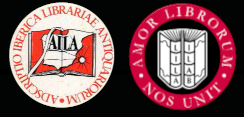


Home |
Temáticas |
Catálogos |
Pedidos |
  |  |
|||||||
|

|
RUGENDAS. (Johann Moritz) HABITANTE DE GOYAS, QUADRO A ÓLEO PINTADO SOBRE MADEIRA. |
|
|
Clique nas imagens para aumentar. PESSOA. (Fernando) MENSAGEM POR FERNANDO PESSOA. [2.ª EDIÇÃO]2.ª Edição. Agência Geral das Colónias. Lisboa. 1941. De 19,9x14,5 cm. Com 103, [iv] págs. Brochado. Bela edição realizada pela Editorial Ática, no mês de Janeiro de 1941, com a folha de rosto a vermelho e preto, com pequena vinheta a vermelho igual à que ornamenta a capa de brochura. Impressão muito nítida sobre papel avergoado de elevada qualidade. Texto com os títulos das partes, as numerações por extenso das respectivas subdivisões e as letras iniciais do primeiro verso de cada poema a vermelho. Segunda edição em que foram corrigidos e datados alguns poemas, conforme um exemplar da primeira edição revisto pelo autor. Rara e procurada segunda edição, muito importante pois mantêm a grafia, anterior a 1911 (ph, por f, y por i) da primeira edição, que Fernando Pessoa considerava característica essencial da obra e que integra alterações da sua autoria. A mensagem é uma obra-prima da poesia portuguesa de todos os tempos caracterizada por uma brilhante concisão e uma capacidade enunciativa fora do comum. Portugal e o seu destino são exaltados pela descrição do país e pela evocação dos seus maiores personagens históricos que contribuíram para a afirmação da nacionalidade e para a expansão portuguesa por todo o mundo, tendo subjacente uma ideia de predestinação nacional. Composta por um conjunto de poesias breves tem unidade de inspiração, uma estrutura arquitectónica, é percorrida por um sopro patriótico de exaltação e de incitamento e por um sebastianismo de apelo e certeza profética. É uma obra de poesia épica ou melhor, epo-lírica com um tom menor e uma atitude introspectiva impregnada de idealismo platónico. Muitos dos versos das suas poesias passaram a ser constantemente citados até por muitas pessoas que não se interessam por poesia e nunca leram a obra. Assim o Padre António Vieira será para sempre – O Imperador da língua portuguesa; os portugueses olham – Com fixos olhos rasos de ânsia/Fitando a proibida azul distância e á pergunta valeu a pena – muitos responderão: Tudo vale a pena/ Se a alma não é pequena.
Beautiful edition by Editorial Ática, in January 1941, with the title page in red and black, with a small vignette in red just like the one that adorns the front cover. Very clear printing on high-quality, thick paper. Text with the titles of the parts, the numbering of the respective subdivisions written in full and the initial letters of the first verse of each poem, all in red. Second edition, in which some poems were corrected and dated, according to a copy of the first edition revised by the author. Rare and sought after second edition, very important because it maintains the spelling, prior to 1911 (ph, by f, y by i) of the first edition, which Fernando Pessoa considered an essential feature of the work and which includes changes by his authorship. “The message” is a masterpiece of Portuguese poetry of all times, characterized by brilliant conciseness and an unusual enunciative capacity. Portugal and its destiny are exalted by the description of the country and by the evocation of its greatest historical characters who contributed to the statement of nationality and to the Portuguese expansion throughout the world, having an underlying idea of national predestination. Composed of a set of short poetry, it has an unity of inspiration, an architectural structure, traversed by a patriotic breath of exaltation and incitement and by a “Sebastianism” (belief on King Sebastian return) of prophetic appeal and certainty. It is a work of epic poetry or better, epic-lyric with a minor tone and an introspective attitude steeped in Platonic idealism. Many of the verses of his poetry have come to be constantly cited by many people who are not interested in poetry and have never read the work, which are proof of the deep-rooted establishment of his work on Portuguese culture. Ref. Jacinto Prado Coelho, Diversidade e Unidade em Fernando Pessoa, Verbo, Lisboa, 1949. Referência: 2010PG017
Local: M-3-A-24 Indisponível Caixa de sugestões A sua opinião é importante para nós. Se encontrou um preço incorrecto, um erro ou um problema técnico nesta página, por favor avise-nos. 
|
Pesquisa Simples




|
||
 |
|||
|